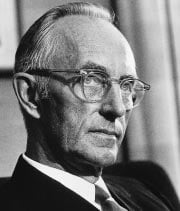
Longtime Johns Hopkins University supporter Alonzo G. Decker, Jr. died of heart failure on March 18 at the age of 94. A Baltimore native and son of the co-founder of the Black & Decker Corporation, Al Decker was a cherished friend, a philanthropist, a businessman, an innovator, and an engineer. Many people, at Hopkins and beyond, will miss his generous personality, passion for life, and visionary thinking.
In 1977, Decker was a member of the ad hoc committee, created by the University’s trustees, that was instrumental in reestablishing a separate school for engineering, which became the Whiting School of Engineering. Through his company, Decker supported the founding of Mechanical Engineering’s design laboratory in Maryland Hall.
At age 14, Decker began working odd jobs at his father’s company. After graduating from Baltimore’s Polytechnic Institute and earning his bachelor’s degree in electrical engineering from Cornell University, he returned to Black & Decker as a full-time employee in the export department. When the Depression took its toll on the company, he was the first to be laid off—reportedly because his father did not want to give the appearance of nepotism. After a period of selling soap flakes to local grocery stores, the young man was eventually re-hired by Black & Decker as a floor sweeper.
In 1933, Decker began his career in earnest when the company promoted him to research and manufacturing engineer. In 1940, he was named vice president and elected to the Board of Directors. By 1964, he was chief executive officer, and four years later was named chairman of the board. He retired in 2000.
Following World War II, after learning that defense workers had been borrowing industrial power drills for home use, Decker was inspired to develop a line of power tools to be sold at local hardware stores. Under his leadership, Black & Decker changed its focus to producing personal power tools, and in 1961 introduced the first cordless, battery-powered drill. The company is widely credited with starting the “do-it-yourself” home improvement movement. Apollo astronauts even used a Black & Decker power drill to gather core samples from the Moon’s surface. Today, Black & Decker, with locations in 50 countries, is internationally renowned for its technical tools and instruments.
Nolan D. Archibald, Black & Decker’s chairman and chief executive officer, credits Al Decker for much of the company’s success. “Mr. Decker was a great, great business leader of the 20th century,” Archibald noted. “He was a man of high personal morals who had an international vision. He was the driver for our global expansion.”
Decker was also a generous advocate for education and philanthropic causes. He and Virginia Gent Decker, his wife of more than 50 years, gave much of their personal wealth to Maryland’s colleges and universities. Elected as a Hopkins trustee in 1968, he chaired the Hopkins Hundreds, the University’s centennial giving campaign—the first in the nation to establish a goal as high as $100 million. The campaign concluded with $112 million in commitments. Al and Virginia Decker endowed two Decker Professorships in Science and Engineering during this campaign. In the 1980s, he served as honorary chairman of the Campaign for Johns Hopkins, during which the Alonzo G. Decker Chair in Mechanical Engineering was endowed in his honor.
“HE HAD TREMENDOUSLY GOOD JUDGMENT AND COMMON SENSE—A PRACTICAL MAN, A SUPERB HUMAN BEING.”Ross Jones ’53 A&S
After stepping down as a trustee, Decker served as a trustee emeritus and presidential counselor. “He was a beloved person around here. Over 34 years, he was a confidant to all our presidents,” observed Ross Jones ’53 A&S, Hopkins vice president and secretary emeritus. “He had tremendously good judgment and common sense—a practical man, a superb human being.”
Decker also served on the advisory board of the School of Continuing Studies (now the School of Professional Studies in Business and Education), where the couple established the Alonzo and Virginia Decker Venture Capital Fund. It supports new programs and enables adults to continue their education while working full-time.
In 1976, the lawns, gardens, and pond in front of Nichols House, the president’s residence, were named the Decker Gardens in honor of Decker and his family. The University awarded him the Milton S. Eisenhower Medal for Distinguished Service in 1983 and an honorary degree in 1986. In 1998, he was inducted into Tau Beta Pi as an Eminent Engineer, an occasion celebrated at Hopkins along with his 90th birthday. And the Alumni Association presented him with its Heritage Award for distinguished service in 1999.
“You shouldn’t just give until it hurts, you should give until it feels real good” was Decker’s motto. His generosity and vision touched many people during his lifetime, and will continue to make a difference in many lives for generations to come.




